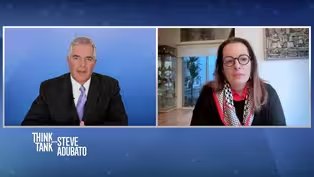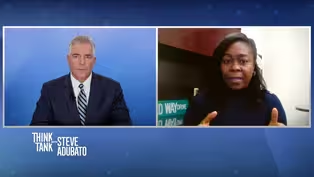
Improving Nurse-to-Patient Ratios in Healthcare
Clip: 2/24/2024 | 9m 39sVideo has Closed Captions
Improving Nurse-to-Patient Ratios in Healthcare
Steve Adubato welcomes Mary Ellen Roberts, Director of Nursing Practice and Acute Care Practitioner Program at Seton Hall University, to talk about the ongoing nursing shortage and improving nurse-to-patient ratios in New Jersey.
Problems playing video? | Closed Captioning Feedback
Problems playing video? | Closed Captioning Feedback
Think Tank with Steve Adubato is a local public television program presented by NJ PBS

Improving Nurse-to-Patient Ratios in Healthcare
Clip: 2/24/2024 | 9m 39sVideo has Closed Captions
Steve Adubato welcomes Mary Ellen Roberts, Director of Nursing Practice and Acute Care Practitioner Program at Seton Hall University, to talk about the ongoing nursing shortage and improving nurse-to-patient ratios in New Jersey.
Problems playing video? | Closed Captioning Feedback
How to Watch Think Tank with Steve Adubato
Think Tank with Steve Adubato is available to stream on pbs.org and the free PBS App, available on iPhone, Apple TV, Android TV, Android smartphones, Amazon Fire TV, Amazon Fire Tablet, Roku, Samsung Smart TV, and Vizio.
Providing Support for PBS.org
Learn Moreabout PBS online sponsorship- We're now joined by Mary Ellen Roberts, who's the chair of the graduate department of nursing at Seton Hall University College of Nursing.
Seton Hall University, one of our higher ed partners.
Mary Ellen, good to see you.
- Oh, same here, nice to see you.
- You got it.
2024, the state of nursing in the state of New Jersey is, please finish that.
- Somewhat chaotic.
- (chuckles) But hold on.
If I asked you the same question, Mary Ellen, in 2022, and 2023, would it be any different or is it a different kind of chaotic?
- I think it would be the same.
- What makes it so chaotic, A, and B, is it... Well, I'm not gonna try to answer my own question.
What contributes to the chaotic nature of nursing in your view, please?
- We have a nursing shortage.
We have a staffing shortage.
And because we have these staffing shortages, we then have a very large nurse to patient ratio, which decreases the quality of care that we can give to our patients, particularly those in the hospital.
- So Mary Ellen, a lot of our work in programming focuses on public policy.
Help us understand the public policy, particularly in the state legislature of New Jersey.
What effort is underway, and how serious is that effort, Mary Ellen, to establish clear nursing ratios, nurse to patient ratios?
Do we have that now?
- We don't have that now, and we need legislation that's gonna give us those clear nurse patient ratios.
The other thing that's in the legislature now is a full practice authority bill for nurse practitioners.
- Can we talk about that?
That is fascinating to me.
Full practice authority, follow this, folks.
And if I have this wrong, Mary Ellen will correct me.
So there's legislation floating around the State House that would allow for certain nurses who have advanced degrees that they would then have the permission to treat a patient and prescribe medications for certain basic, quote unquote basic health issues.
Right now they do not have that.
And if I'm not mistaken, Mary Ellen, there are physician groups fighting against that.
- Oh, absolutely, yes.
The Medical Society of New Jersey is fighting against it.
Full practice authority means that we won't keep what's called our joint protocol or collaborative agreement so that we can go and we can practice on our own.
During the COVID pandemic, the governor did waive that joint protocol so that we were able to practice without joint protocol or physician collaboration.
- So I wanna be clear.
The joint protocol, as I understand it, a nurse had to go to a physician to get sign off on certain prescriptions or certain medical procedures, and that was put aside during when COVID was really bad.
And now it still exists that you need that prior approval or whatever the heck it's called.
And there's an effort underway to do away with that.
But the Medical Society, as they've testified, Mary Ellen, has said, they've said, you know what?
That would also, if you allowed advanced practice nurses to do this, it could potentially negatively impact patient care.
You say?
- I say it doesn't.
We have much data out there that shows the quality of care that nurses give, that nurse practitioners and advanced practice nurses give to patients in the state of New Jersey, we have data that shows that we prescribe less than physicians do.
And I think that based on what happened during the COVID pandemic, we proved ourselves that we certainly can do this without any type of physician oversight.
- Let me ask you this, then.
If you believe the evidence, the science, the experience of COVID proves what you just said, then what would be the possible rationale for organized groups representing physicians in this state, fighting against it?
What would be their rationale?
- So I've been doing this a long time.
I've been fighting physicians for a long time, and I really think that it all becomes a turf battle.
- Turf over what?
- Patients, that we're gonna take patients away from them.
There's plenty of patients out there for everybody to be able to, - so, hold on, Mary Ellen.
But, P.S.
let's make sure, I'm telling our producers in real time, let's make sure we have a representative from the Medical Society so they can make their case about this.
But now patients become turf?
- Well, it's becomes, yeah, it's a turf battle.
It's, you know, I open a practice on one block, and the physician opens a practice on another block.
We're all vying for the same patients.
- So it's economic.
- It's economic, it's definitely economic.
And they don't feel that we're safe.
They really don't think that we're safe, and we have data that proves otherwise.
- Mary Ellen, you're the chair of the graduate department of nursing at Seton Hall University.
Again, one of our higher ed partners is the College of Nursing.
But you're also, you're a practicing nurse as we speak?
- Yes, I practice one or two days a week as well as do my full-time position at Seton Hall.
- Why do you still practice?
- Because I think it's important that...
I'm a nurse first, and I think it's really important for students to see that the people that are teaching them are still on the front lines, still practicing in the areas in which we're teaching them.
And students appreciate that.
Students really appreciate the fact that we are still practicing.
All the faculty members in the graduate department are still practicing.
- There's a shortage of nurses.
It impacts obviously negatively the nurse patient ratio.
But my understanding is there's evidence that the number of people going into the field of nursing has increased since COVID.
And what's happening at the graduate level?
Are there more nurses, fewer nurses?
What's going on there?
- So at the graduate level, actually numbers across the country have gone down in terms of enrollments.
And there's a lot, I recently did a study of registered nurses across the country.
And what we found in that study was, and it was registered nurses who were on the front lines during COVID.
And what we found doing that study was that nurses are burnt out.
That many of them want to go back to school, but they just don't have the emotional capacity at this point to go back.
That's gonna turn around.
- It is, but let me ask you this, if travel nurses, the nurses who go from hospital to hospital are making so much more money than staff nurses, why would someone choose to be a staff nurse if they can make more money as a traveling nurse, not on staff, moving around?
- That's a good question.
And there are many staff, there are many people that are doing that, the travel nursing.
And that's part of the issue, that you don't have the stability on your unit of somebody who's on your unit full-time that is dedicated to that particular unit or that particular hospital.
- I promise our audience we'll continue to do programming, looking at the field of nursing, the impact it has on patient care and how it evolves over time.
And again, we will have a physician leader talking about this issue of the full practice authority for nurses in another segment.
Mary Ellen Roberts, chair of the graduate Department of Nursing at Seton Hall University College of Nursing.
Mary Ellen, thanks so much.
- Thank you.
- You got it.
Stay with us, we'll be right back.
- [Narrator] Think Tank with Steve Adubato has been a production of the Caucus Educational Corporation.
Celebrating 30 years in public broadcasting.
Funding has been provided by The Healthcare Foundation of New Jersey.
Community FoodBank of New Jersey.
The North Ward Center.
The New Jersey Economic Development Authority.
The New Jersey Education Association.
Johnson & Johnson.
Robert Wood Johnson Foundation.
PNC Foundation.
And by The Russell Berrie Foundation.
Promotional support provided by NJ.Com.
And by The New Jersey Business & Industry Association.
The North Ward Center continues to expand their services and outreach in Newark, from the childhood years to the golden years, Offering programs like preschool, youth leadership development, Casa Israel Adult Medical Day program our Family Success center, as well as a gymnasium.
And most recently Hope House, a permanent home for adults with autism, supporting and nurturing our autism community with Hope House 2 coming soon.
The North Ward Center.
We’re here when you need us.
Government Regulations Needed for Artificial Intelligence
Video has Closed Captions
Clip: 2/24/2024 | 9m 57s | Government Regulations Needed for Artificial Intelligence (9m 57s)
Strengthening the Family Unit and Combatting Food Insecurity
Video has Closed Captions
Clip: 2/24/2024 | 8m 49s | Strengthening the Family Unit and Combatting Food Insecurity (8m 49s)
Providing Support for PBS.org
Learn Moreabout PBS online sponsorship
- News and Public Affairs

Top journalists deliver compelling original analysis of the hour's headlines.

- News and Public Affairs

FRONTLINE is investigative journalism that questions, explains and changes our world.












Support for PBS provided by:
Think Tank with Steve Adubato is a local public television program presented by NJ PBS

